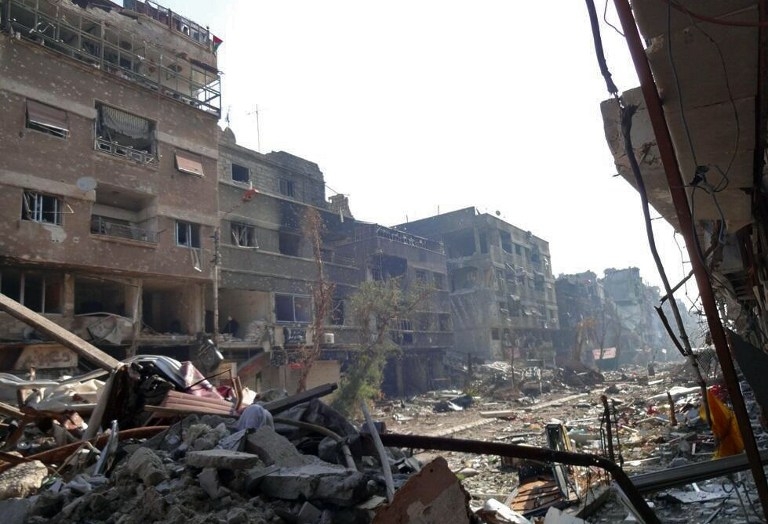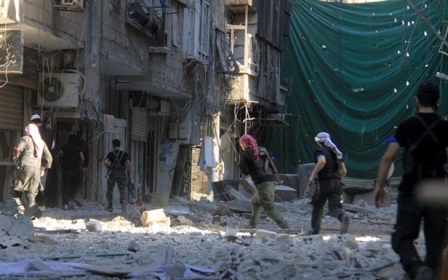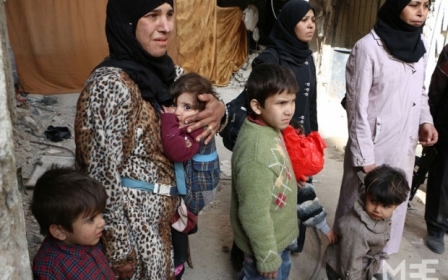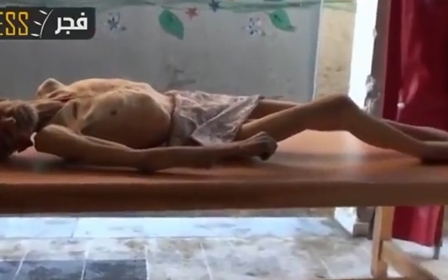IS takes control of 90 percent of Yarmouk, called 'hell hole' by UN official

Four days into its offensive on the Palestinian refugee camp in the Syrian capital, the Islamic State (IS) group now control 90 percent of it, according to a Syrian monitoring group.
After being expelled from the area on Thursday, IS along with the al-Nusra Front – in opposition to IS elsewhere in the country - have captured most of Yarmouk in southern Damascus, the Syrian Observatory for Human Rights reported on Saturday.
A spokesman for the Islamist rebel group Ahrar al-Sham posted on Twitter also on Saturday that the group had started its own battle to support Yarmouk residents.
The capture of most of the camp comes a day after residents say IS fighters seized control of a mosque and used the loud speaker - normally reserved for calls to prayer - to tell the fighters with the Aknaf Beit al-Maqdis rebel group to turn themselves in.
Nusra and IS are fighting on the same side in Yarmouk after Aknaf Bait al-Maqdis, a group based in the camp who are currently battling IS, failed to come to Nusra’s aid during a fight last month between the al-Qaeda linked group and the Syrian Free Army, a Yarmouk-based journalist told MEE this week.
As gun battles between IS, Nusra and Aknaf Bait al-Maqdis fighters have ensued in recent days, the Syrian government has bombed the camp with mortar shells from the air, the journalist said.
Tayseer Abu Baker, head of the Palestinian Liberation Front in Syria, part of the Palestine Liberation Organisation, told Reuters over the phone that the Islamic State had killed 21 people including fighters and civilians since Friday.
“Some families are trying to exit the camp but with Islamic State snipers on rooftops of high buildings that is very difficult,” he said. He added IS had kidnapped at least 74 people from the camp and that civilians were trying to flee.
In Gaza, Hamas leader Ismail Haniyeh called for an immediate stop of bloodshed in Yarmouk, saying that the fighting parties must spare the lives of the Palestinian refugees.
Ezzat Resheq, a member of Hamas’ political bureau, condemned the “atrocities” committed against the camp, and called on the Palestinian Authority and other Palestinian factions to undertake urgent actions to resolve the dilemma of the Palestinians in Yarmouk, as well as lifting the siege imposed on the camp since the end of 2012.
Under siege
Though called a camp, Yarmouk, established in the 1950s, was home to 160,000 Palestinian refugees of which many were second or third generation, and was hardly distinguishable from many other neighbourhoods in Syria when the civil war started in 2011.
Since December 2012, the area has been under a government siege, preventing the entry of food and goods which has brought its residents “to the brink of starvation,” according to an Amnesty International report from last year.
A short documentary called “The Siege,” produced by Syrian NGO Bidayyat for Audiovisual Arts and made via Skype by working with 12 young people in Yarmouk, shows how the siege has impacted the everyday lives of young people in the area.
One of the filmmakers, Jamal Khalife, was killed on Wednesday on the first day of the IS offensive.
In one scene of the film, a group of teenage boys sit in a dark house by candlelit without electricity. When electricity suddenly comes on, everyone rushes around the house, searching for mobile phone chargers and electric shavers.
In another scene, a young girl named Dana rolls a heavy water vat as big as her own body through the street, distributing water into smaller buckets, apparently for residents.Another young person sits in a burned out bus at the Yarmouk Bus Station which once connected residents to the centre of Damascus, reflecting on his memories of the time before the war.
“The smell of vegetables mingles with the scent of an old man, the fragrance of a beautiful woman,” he remembers. “The sound of the radio mingles with the voice of a young man telling his girlfriend: ‘I’ll meet you in fifteen minutes outside the university.’”
A hell hole that shames the world
In January 2014, an agreement was brokered with the Syrian government to allow humanitarian access to the camp, but the agreement broke down last March and UNRWA’s ability to supply the camp has since been limited.
According to the UN Reliefs and Work Agency (UNRWA), a steady supply of water has not been available since September and, during cold snaps in recent months, residents have burned their clothes and furniture for heat.
More than 170 people have reportedly died from dehydration, severe malnutrition, or disease since the start of the siege. Today, around 18,000 residents are thought to remain after many fled.
In January, residents told MEE that they felt their situation had been ignored by activists and the international media and held a protest.
"In order to break the siege,” a former Palestinian resident of the camp, who did not wish to be named, told MEE, “you need to first break the silence surrounding it".
On Friday, Chris Gunness, UNRWA spokesman, said food distribution has been impossible since the outbreak of fighting on 1 April and said the agency “in the strongest possible terms” demanded armed groups to respect their obligations to protect civilians.
Yarmouk, he told BBC Radio 4 on Friday, is “a hell hole that shames the world and, in the last days, it had descended further”.
New MEE newsletter: Jerusalem Dispatch
Sign up to get the latest insights and analysis on Israel-Palestine, alongside Turkey Unpacked and other MEE newsletters
Middle East Eye delivers independent and unrivalled coverage and analysis of the Middle East, North Africa and beyond. To learn more about republishing this content and the associated fees, please fill out this form. More about MEE can be found here.




